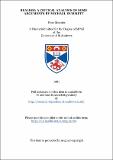Files in this item
Realism: a critical analysis of some arguments by Michael Dummett
Item metadata
| dc.contributor.advisor | Read, Stephen | |
| dc.contributor.author | Menzies, Peter Charles | |
| dc.coverage.spatial | vi, 148 p. | en_US |
| dc.date.accessioned | 2018-06-28T08:37:27Z | |
| dc.date.available | 2018-06-28T08:37:27Z | |
| dc.date.issued | 1981-07 | |
| dc.identifier.uri | https://hdl.handle.net/10023/14680 | |
| dc.description.abstract | CHAPTER ONE This thesis is a critical analysis of arguments which Michael Dummett has developed against realism. Dummett characterizes realism as the thesis that the meaning of sentences should be analyzed in terms of the notions oftruth and falsity which obey the classical principle of bivalence. Before examining Dummett's arguments against realism, I consider the two models Dummett proposes for analyzing the content of assertions and examine his thesis that the realist notion of truth is induced for some sentences by their use as constituents in compound sentences. CHAPTER TWO I begin the examination of Dummett's arguments against realism by noting that Dummett allows in his recent work that a Tarskian truth-theory, couched in terms of a non-classical notion of truth, may act within a theory of meaning as the theory of reference yielding an inductive specification of truth- conditions. I then present Dummett's distinction between modest and full- blooded theories of meaning and suggest that the difference between them lies in the fact that the latter type possesses, while the former type lacks, a theory of sense, which Dummett conceives of as a series of correlations between practical abilities and T-sentences. I then consider the manifestation form of the argument against realism and argue that it fails on several counts. I then consider the acquisition form of the argument and point out the disputable assumptions about language-acquisition on which it is based. In the concluding section I question whether a theory of meaning which makes due allowance for idealization in the study of semantic competence should require a theory of sense of the kind Dummett suggests and question why the theory of reference should be responsive to the particular practical abilities which Dumniett emphasizes. CHAPTER THREE In this chapter I complete the discussion of Dummett's arguments against realism and argue that Dummett has no satisfactory line of defence against my principal reaction to the manifestation form of the argument against realism. I then present Dummett's distinction between demonstrations and canonic al proofs his general distinction between between direct and indirect verifications. Then consider Dummett's attempts to characterize mathematical truth in terms of canonical proof and general truth in terms of direct verification. I conclude by outlining a problem which confronts a verificationist theory meaning of the kind Dummett espouses and show that there is a flaw in his argument that a verificationist theory of meaning leads to a rejection of classical logic. CHAPTER FOUR I begin this chapter by examining Dummett's claim that reductionism is neither necessary nor sufficient for anti-realism. I argue that there is a sense in which reductionism is necessary and claim that there is a way of uniformly characterizing anti-realist positions on a number of subjects in terms of the thesis that a sentence is true in virtue of the evidence existing for it. I then consider Dummett's claim that a realist interpretation of counterfactuals involves asserting the unrestricted validity of the law of conditional excluded middle. I conclude by arguing that the anti-realist cannot acknowledge the defeasibility of evidence for empirically undecidable sentences and at the same time meet a legitimate demand that he explain in terms which do not beg any questions his conception of truth for such sentences. | en_US |
| dc.language.iso | en | en_US |
| dc.publisher | University of St Andrews | |
| dc.subject.lcc | B835.D8M3 | |
| dc.subject.lcsh | Realism--Philosophy | en |
| dc.subject.lcsh | Dummett, Michael, 1925-2011 | en |
| dc.title | Realism: a critical analysis of some arguments by Michael Dummett | en_US |
| dc.type | Thesis | en_US |
| dc.type.qualificationlevel | Masters | en_US |
| dc.type.qualificationname | MPhil Master of Philosophy | en_US |
| dc.publisher.institution | The University of St Andrews | en_US |
This item appears in the following Collection(s)
Items in the St Andrews Research Repository are protected by copyright, with all rights reserved, unless otherwise indicated.

